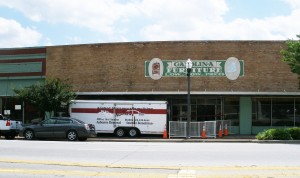The asbestos removal at the old Belk/Carolina Furniture building on Main Street in Dillon appears to have begun. On Saturday, a crew from Applied Abatement Demolition, which specializes in asbestos removal and interior demolition, were working at the building. Since it was Saturday, no one was available at city hall for comment as offices were closed.
Adam Myrick of DHEC told The Herald back in March that the demolition of what are being called the “Dilmar” buildings, due to the fact that they were donated to the city by Dilmar Oil Co., was halted because it was determined that the building contained asbestos and because the city had failed to get a permit from DHEC. At that time, Myrick said that the city would have to do an asbestos abatement plan on how to remove and dispose of the material.
A day prior to the beginning of the demolition of the buildings back in March, local developer Allen Watts appeared at the council’s March 12th meeting and made an impassioned plea to the Dillon City Council to save the buildings. He asked the city to give him the buildings and that he would bring them up to code with his own money. Watts’ plea seemed to fall on deaf ears, and on Tuesday, March 13th, the demolition began until halted by DHEC shortly thereafter.
At that March meeting, Mayor Todd Davis said that a detailed analysis of the building had been done, and and it would cost hundreds of thousands of dollars to bring these buildings up to code. He said at that time that that he could canvass the community, and it would be 50-50 as to whether to tear it down. However, in a Herald reader poll, our readers voted overwhelmingly that Allen Watts should be given a chance to restore the buildings. The vote was Yes-90%-1,064 votes, No-8%-94 votes, Maybe-2%-10 votes, and Do not know or care-1%-16 votes. A protest was held at the site against taking down the buildings, and The Herald received phone calls and letters to the editor against the demolition of the buildings.
The Herald will attempt to learn more about the work that is being done and the city’s plans when city hall opens back up for business on Monday.
UPDATED STORY:
By Betsy Finklea
The asbestos removal at the old Belk/Carolina Furniture building on Main Street in Dillon has begun.
City Manager Glen Wagner said the work began on Monday. He said once the asbestos removal is complete, the same company will also demolish the building.
A crew from Applied Abatement Demolition, which specializes in asbestos removal and interior demolition, were working at the building.
Adam Myrick of DHEC told The Herald back in March that the demolition of what are being called the “Dilmar” buildings, due to the fact that they were donated to the city by Dilmar Oil Co., was halted because it was determined that the building contained asbestos and because the city had failed to get a permit from DHEC. At that time, Myrick said that the city would have to do an asbestos abatement plan on how to remove and dispose of the material.
A day prior to the beginning of the demolition of the buildings back in March, local developer Allen Watts appeared at the council’s March 12th meeting and made an impassioned plea to the Dillon City Council to save the buildings. He asked the city to give him the buildings and that he would bring them up to code with his own money. Watts’ plea seemed to fall on deaf ears, and on Tuesday, March 13th, the demolition began until halted by DHEC shortly thereafter.
At that March meeting, Mayor Todd Davis said that a detailed analysis of the building had been done, and and it would cost hundreds of thousands of dollars to bring these buildings up to code. He said at that time that that he could canvass the community, and it would be 50-50 as to whether to tear it down. However, in a Herald reader poll, our readers voted overwhelmingly that Allen Watts should be given a chance to restore the buildings. The vote was Yes-90 percent-1,064 votes, No-8 percent-94 votes, Maybe-2 percent-10 votes, and Do not know or care-1 percent-16 votes. A protest was held at the site against taking down the buildings, and The Herald received phone calls and letters to the editor against the demolition of the buildings.










